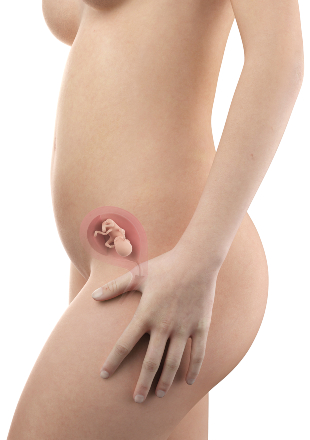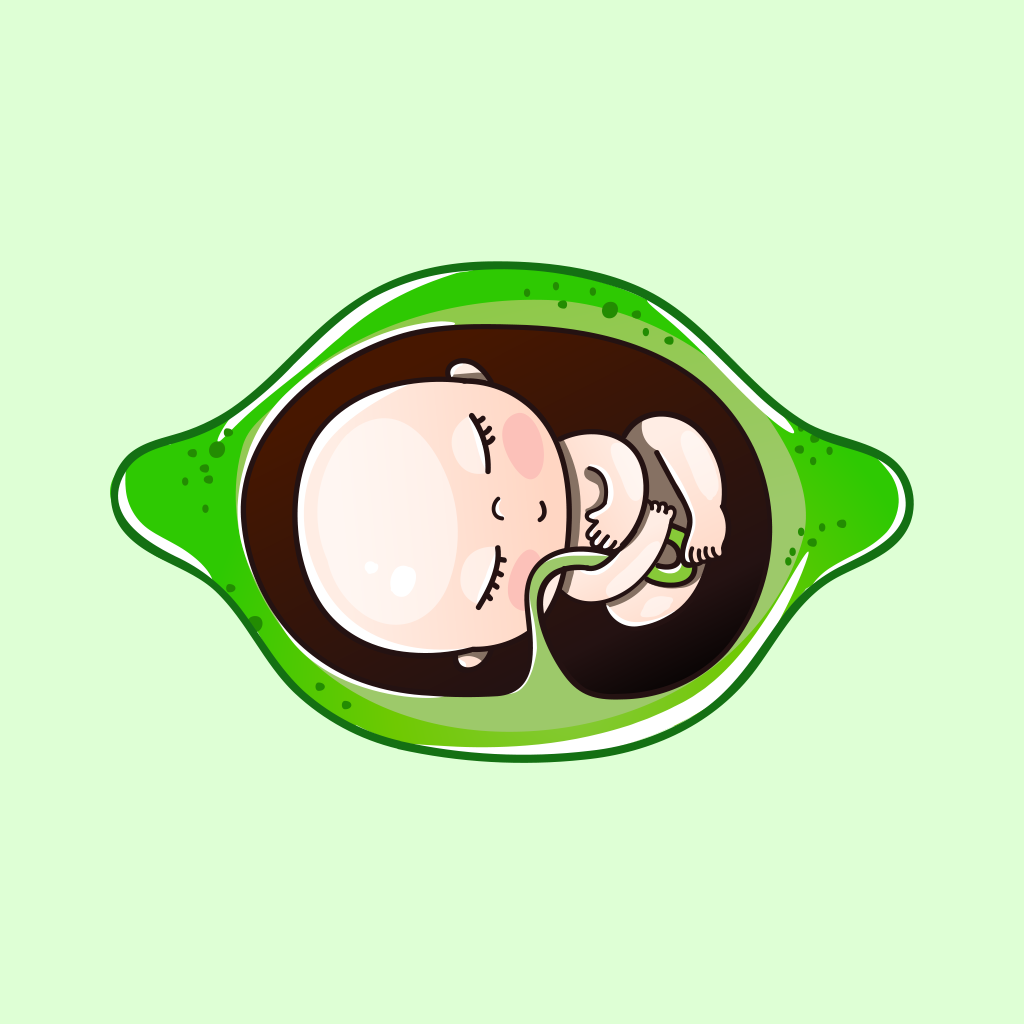Welcome to Week 12! You’ve reached an important milestone—by now, many women start to feel more at ease as the first trimester comes to an end. If you’ve been coping with nausea, exhaustion, or mood swings, you may notice these symptoms beginning to ease up. Your body has been working incredibly hard, and it’s perfectly normal to feel both relief and excitement as you move closer to the second trimester.
At this stage, your baby is about the size of a small plum—around two inches long and growing rapidly each day. Tiny fingers and toes are appearing more defined, and your baby can now open and close their fists. Their organs, including the kidneys and intestines, are developing, and bones are starting to harden. It’s also around this time that those little vocal cords begin to form, laying the groundwork for their very first cries after birth.

On the outside, you might notice your clothes fitting a bit differently as your waistline expands. Some moms-to-be start to feel that famous “pregnancy glow” thanks to increased blood flow and hormones. It’s also common for your energy to return—if you feel up to it, now might be a good time to enjoy light exercise, spend time with loved ones, or start a journal to capture your feelings and experiences so far.
Your next prenatal appointment could include listening to your baby’s heartbeat with a special device called a Doppler. Hearing that steady little beat for the first time is a memory many parents treasure forever. If you’re offered genetic screenings or blood tests this week, know that these are a routine way to help check on your baby’s development early on. Don’t hesitate to ask your healthcare provider any questions you have—they’re there to support and guide you.
- Eat balanced meals to support your growing baby and your own health.
- Stay hydrated and get plenty of rest.
- Continue taking prenatal vitamins as your doctor recommends.
Remember, every pregnancy journey is unique. Celebrate making it to Week 12, and trust that each new change brings you closer to meeting your baby.
Your Baby’s Development This Week
At 12 weeks, your little one is going through some truly incredible changes! Right now, your baby is about the size of a plum, measuring just over 2 inches from head to bottom. Even though your baby is still tiny, a lot is happening in that cozy space inside your belly.
One of the biggest milestones at this stage is that nearly all of your baby’s major organs and body systems are in place. These organs might still be very small, and they have a lot of growing and maturing to do, but the foundation is set for the rest of your pregnancy. This week marks the beginning of a shift from rapid organ formation to steady growth and fine-tuning.
- Tiny Movements: Your baby is starting to wiggle! While you probably won’t feel those first movements just yet, your little one is kicking, stretching out, and even making small swallowing motions. The muscles are developing, and your baby’s body is getting used to moving.
- Facial Features: Your baby’s face is becoming more distinct. Eyes, which started out on the sides of the head, are moving closer together, and tiny eyelids are beginning to cover them. The nose and chin are taking shape, and those unique facial expressions are starting to form.
- Hands and Fingers: Fingernails are starting to grow, and those little fingers can now open and close. It’s amazing to picture your baby already practicing tiny hand movements!
- Vocal Cords: Even though your baby won’t use them for a while, vocal cords are now formed. In the months ahead, these will eventually help your baby cry their first hello.
- Swallowing and Digesting: Your baby’s digestive system is learning to work. Gently swallowing amniotic fluid helps the intestines and kidneys practice their roles. The kidneys now create urine, which gets passed out into the amniotic fluid — this is perfectly normal!
- White Blood Cells: Your baby’s bone marrow has started making white blood cells, which are an important part of the immune system. These will help your child fight off germs and stay healthy after birth.
Inside your womb, your baby has more room now because the intestines have moved from the umbilical cord into the growing abdomen. That little heart is beating strong and fast — usually, around 120–160 beats per minute, much quicker than yours!
This is also when your baby’s brain is undergoing rapid growth. Nerve cells are multiplying quickly, starting a journey of development that will continue into childhood. Even though the head is still quite large compared to the rest of the body, your baby is beginning to look more like a newborn every day.
As you celebrate making it to this week, take a moment to marvel at how far your baby has come. Each day brings new growth and exciting progress — in just a few short months, you’ll finally get to meet the little person who’s already working so hard inside you!
Changes in the Mother’s Body
Reaching 12 weeks of pregnancy is a meaningful milestone, and you might start to notice some welcome changes in your body. This is a time when many early symptoms like persistent nausea or extreme tiredness might start to fade, and your body is gearing up for the months ahead.
Some women notice that their waistline is slowly starting to change. If your pants fit a little tighter or you’re more comfortable in stretchier clothes, that’s completely normal. Some women start to notice a tiny bump, while for others, their belly looks much the same as before. Every pregnancy is unique, so don’t worry if you aren’t “showing” yet or if you are already starting to see changes in your shape.
Skin changes are another common experience around this time. You might notice that your skin appears a bit more radiant—often called the “pregnancy glow.” This happens thanks to increased blood flow and hormones, which can give your cheeks a rosy tint and your skin a bit more shine. However, these same changes can also bring about some surprises. A few more pimples than usual, or patches of darker skin known as melasma, may appear. These are usually temporary and tend to settle down as pregnancy progresses.
Inside your body, your blood volume is increasing to nourish your growing baby. This can bring some new sensations you might not expect, like feeling a little lightheaded when you stand up too quickly. Try to move slowly from sitting or lying down, and stay well-hydrated to help your body adjust.
- Breasts: Many women notice changes in their breasts, such as a fuller feeling, more visible veins, or a slight increase in size. It’s also common for the nipples and the area around them (areolas) to get darker, and you might see tiny bumps that look like goosebumps—they’re completely normal and help your body prepare for breastfeeding later on.
- Digestion: With hormones relaxing your muscles, you could experience more bloating or slower digestion. Eating smaller meals and including fiber-rich foods like fruits and greens can help ease any discomfort.
- Mood Swings: Hormones can still affect your emotions, even as morning sickness fades. It’s normal to feel both excited and worried as you process all the changes. Taking breaks, talking openly with loved ones, and gentle activities like walking can support your emotional well-being.
- Vaginal discharge: You may notice an increase in clear or milky discharge, which is generally harmless and helps keep the birth canal healthy. If you notice anything unusual, such as a strong odor or itching, let your healthcare provider know.
Your uterus is growing and is now about the size of a grapefruit. This can put a bit of pressure on your bladder, so it’s common to make a few extra trips to the bathroom. Don’t be alarmed if you notice mild aches or stretching sensations in your lower abdomen—these are typically just signs that your body is making room for baby.
Finally, around this stage, many women start to feel a sense of relief as the risk of miscarriage decreases after the first trimester. It’s a wonderful time to celebrate your progress and look forward to the second trimester, which is often known for increased energy and comfort. Listen to your body, continue making healthy choices, and don’t hesitate to ask for help or reassurance when you need it—you’re doing great.
What Medical Checkups to Expect at 12 Weeks Pregnant
Reaching 12 weeks is an exciting moment, and your prenatal care is as important as ever. Around this time, your doctor or midwife will want to check on both you and your growing baby to help make sure everything is progressing just as it should. Here’s what you can expect at your week 12 checkup, explained simply:
- Listening to your baby’s heartbeat: For many moms, the highlight of this visit is hearing your baby’s heartbeat for the first time. Your provider will use a small device pressed gently on your belly to capture the sound. It’s a magical moment that can help you begin to feel more connected to your little one.
- Physical checkup for mom: Your blood pressure and weight will usually be checked at every appointment. Your healthcare team wants to keep an eye on these numbers—they’re important signs of how you and your baby are both doing.
- Urine sample: You’ll probably be asked to provide a quick urine sample. This is a simple way for your provider to check for proteins (which can be a sign of certain pregnancy issues) and screen for sugar levels.
- First-trimester screenings: Many parents are offered special baby screening tests around this time. These can include a blood test and an ultrasound called a nuchal translucency scan. These help check if your baby is at risk for certain genetic conditions, like Down syndrome. Your healthcare provider will walk you through your choices and answer any questions you have, so you can decide what feels right for you and your family.
- Prenatal blood tests: If you haven’t had them yet, this may be when your provider checks your blood for things like your blood type, iron levels, infection screening, and immunity to diseases such as rubella and chickenpox.
- Ultrasound scan: Some moms will have an ultrasound now, which lets you see your baby on the screen! This scan checks your baby’s size and how they’re developing, and can sometimes spot twins or other surprises. Not every provider schedules an ultrasound at 12 weeks, but if you get to see your little one, it’s a special moment to treasure.
If you have any concerns or symptoms—like unusual pain, heavy bleeding, or constant nausea—be sure to bring them up. Every pregnancy is unique, and your questions are always important.
Remember, these checkups are a partnership. Your healthcare provider is there to support you, answer your questions, and help you feel confident as your pregnancy journey continues. The 12-week milestone is a wonderful opportunity to take stock, ask about what comes next, and celebrate your growing baby!
Nutritional Tips and Physical Exercise
By week 12, your body is working hard to support your growing baby—so giving it the right fuel and keeping active are two of the best gifts you can give yourself and your little one.
Eating Well for You and Baby
- Balance Is Key: Try to include something from every food group in your meals—colorful veggies, fresh fruits, lean meats or plant-based proteins, and whole grains, like oats or brown rice. This variety nourishes you and your baby with the nutrients you both need.
- Iron-Boosting Foods: Your blood volume is expanding now, so foods high in iron—like spinach, beans, eggs, or fortified cereals—are especially important. Pairing them with vitamin C-rich foods (such as oranges or bell peppers) makes it easier for your body to use the iron.
- Smart Snacking: Hunger can strike at any time! Keep handy snacks like unsalted nuts, yogurt, or a sliced apple with peanut butter nearby. These options are filling and loaded with goodness for you and baby.
- Help for Digestion: Around this time, many women notice shifts in digestion. Whole grain breads, pears, lentils, and plenty of water can help keep things moving smoothly.
- Fresh Is Best: Whenever possible, choose whole foods over processed snacks. Simple home-cooked meals—even something as easy as a veggie stir-fry—are packed with vitamins and much less salt and sugar.
Staying Active Safely
- Gentle Exercise: Movement can boost your energy, improve sleep, and lift your mood. Activities like walking, swimming, or prenatal yoga are gentle on your body, keep your heart healthy, and can ease pregnancy aches.
- Start Slow: If you weren’t very active before pregnancy, that’s okay. Try starting out with a 10-minute stroll and slowly build up from there. Every bit of movement helps!
- Stay Hydrated: Make sure to drink water before, during, and after your activity. Bring a water bottle with you, especially if it’s warm outside or you’re exercising indoors.
- Check-In with Yourself: Listen to your body. If something feels off, like pain or feeling very tired, pause and rest. Pregnancy isn’t the time to push through discomfort.
- Stretch Gently: Light stretching before and after exercise can help prevent muscle soreness and keep you flexible as your body changes.
Remember, every mom’s journey is unique. Eating healthy and finding enjoyable ways to move your body are wonderful ways to care for yourself and your growing baby. If you ever have questions about what’s safe or best for you, your doctor or midwife is there to guide you. You’re doing an amazing job!
Weekly Checklist
Congratulations—you’ve made it to week 12! This week, you’re reaching a big milestone, and it’s a great time to check in on yourself and your growing baby. Here are some helpful suggestions to keep you feeling your best and support your baby’s healthy development:
- Schedule your prenatal visit: If you haven’t already, make sure you have a 12-week prenatal appointment booked. This is often when you’ll get to listen to your baby’s heartbeat—a truly special moment!
- Learn about screening options: Talk to your doctor about first-trimester screening tests. Ask if non-invasive prenatal testing (NIPT) or an ultrasound for nuchal translucency is right for you, especially if you’re unsure or have questions.
- Start tracking your energy levels: You might notice your fatigue starting to fade. Try to gently increase activity—take short walks or do light stretching as you feel able, but remember to rest when you need to.
- Monitor your hydration: It’s easy to forget to drink enough water, especially as your days get busier. Keep a water bottle nearby and sip regularly to stay hydrated.
- Refresh your meal choices: Now that morning sickness might be easing, plan meals with colorful veggies, fruits, lean proteins, and whole grains. Experiment with new recipes or foods you’ve been avoiding due to nausea.
- Watch for changes in your skin: You may notice brighter, more radiant skin—or possibly a few breakouts. Use gentle skincare products and avoid anything labeled “retinoid” or “retinol,” which aren’t recommended during pregnancy.
- Start writing down questions: As your bump gently grows, new questions may come up about work, exercise, or what’s safe. Jot them in a notebook or your phone so you can easily ask your healthcare provider at your next appointment.
- Review your medications and supplements: Double-check with your doctor or pharmacist that anything you’re taking—vitamins, herbal teas, or over-the-counter meds—are still safe as your pregnancy progresses.
- Notice emotional shifts: Hormone changes might bring mood swings or extra sensitivity. Reach out to friends, family, or a counselor if you’d like some extra emotional support.
- Begin making time for yourself: As you transition to the second trimester, consider small acts of self-care—like reading, listening to music, or gentle yoga—to help you feel balanced and refreshed.
Every pregnancy is unique, so trust your body and don’t hesitate to ask for help or reassurance whenever you need it. You’re doing an amazing job!
When to Call Your Doctor
It’s natural to have questions and some worries in early pregnancy, but there are certain symptoms that should never be ignored. Trust your instincts—if something feels off, it’s always okay to reach out. Here are some signs that mean it’s time to call your healthcare provider right away:
- Vaginal bleeding: Light spotting can be normal, but if you have heavier bleeding (soaking a pad), passing clots, or the blood is bright red, let your doctor know as soon as possible.
- Severe belly pain: A mild ache or occasional stretching sensation is common, but if you have strong, cramping pain or sharp pain that doesn’t go away, seek medical advice.
- Fever over 100.4°F (38°C): A high fever can be risky in pregnancy. If you can’t bring it down with acetaminophen or if you feel chilled, achy, or unwell, give your doctor’s office a call.
- Unusual discharge: While some increase in discharge is normal, call your provider if it’s foul-smelling, greenish, yellow, or contains blood, or if you feel itching or burning.
- Severe or persistent headache: Headaches are common, but if you develop a bad headache that won’t improve with rest or fluids—especially along with changes in vision or swelling—get checked.
- Blurred vision or spots before your eyes: Sudden changes in vision, along with dizziness or fainting, need medical attention right away.
- Burning when you pee, or trouble urinating: This could be a sign of a urinary tract infection, which can get serious fast during pregnancy if not treated.
- Vomiting that won’t stop: If you can’t keep any food or water down for more than a day, or you’re feeling weak and lightheaded, reach out—severe dehydration isn’t safe for you or your baby.
- Sudden swelling: If you notice that your face, hands, or ankles swell up quickly, especially with headaches or vision changes, call your provider.
- Feeling much less pregnant: If your nausea, breast tenderness, or other common pregnancy symptoms suddenly disappear, or you just feel “off,” it’s always okay to check in.
Remember, you know your body best. If you have a symptom that doesn’t feel right, or you’re unsure whether it’s serious, it’s always better to get checked. Your medical team is here to support you every step of the way.
Preparations for Baby
Reaching week 12 is a wonderful step forward, and it’s natural to start thinking more about welcoming your baby home. Even though your due date still feels far away, a little early planning can help you feel more confident and organized. Here are some simple ways to prepare emotionally and around your home this week:
- Take things one day at a time:
Pregnancy can feel overwhelming, especially if you’re worrying about the future. Try to focus on the present, appreciating each new change without pressuring yourself to have everything figured out. - Start a baby journal or keepsake box:
Writing down your thoughts or collecting little mementos (like ultrasound photos or letters to your baby) can help you connect emotionally and will be a precious memory years later. - Gently clear and declutter:
If you have the energy, take small steps to tidy up shared spaces. Clearing a shelf, organizing a corner, or simply making room in your closet can set the stage for when baby items start arriving at home. - Begin a list of questions:
Jot down things you want to ask your doctor or midwife—anything from baby gear to birth plans. No question is too small, and having a list handy makes your next checkup feel more productive and reassuring. - Connect with your support system:
Let family or friends know how you’re feeling this week or ask for help with everyday tasks. Just knowing you’re not alone can make the journey less stressful. - Explore baby basics:
Start learning about newborn needs, like safe sleep habits or how to swaddle. Even just reading a short article or watching a video can help you feel more prepared, one topic at a time. - Celebrate your progress:
Take a moment to be proud of how far you’ve come. Pregnancy isn’t always easy, but every week is a step closer to meeting your little one.
Remember, you don’t need to have your home or heart completely ready right now. Give yourself grace, gather support when you need it, and allow yourself to enjoy these moments of anticipation. Your love and care are already the best kind of preparation your baby could ask for.
Citations and References
- American College of Obstetricians and Gynecologists (ACOG) – Offers comprehensive guidance on fetal development and prenatal care during the first trimester, including week 12 milestones and recommended screenings. Visit Source
- Centers for Disease Control and Prevention (CDC) – Provides recommendations on prenatal nutrition, necessary vitamins (such as folic acid), and lifestyle modifications during pregnancy. Visit Source
- Mayo Clinic – Detailed week-by-week development updates, including baby size, organ formation, symptom relief, and maternal changes at week 12. Visit Source
- Cleveland Clinic – Describes fetal growth, maternal symptoms, prenatal tests, and dietary guidelines specific to week 12 of pregnancy. Visit Source
- National Institutes of Health (NIH) – Covers early fetal development, organ function at 12 weeks, and evidence-based prenatal health advice. Visit Source
- World Health Organization (WHO) – Global standards for maternal and newborn health, including prenatal screening and essential nutrition during the first trimester. Visit Source










